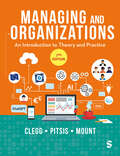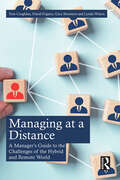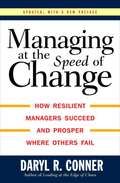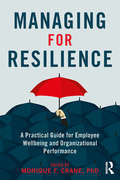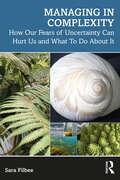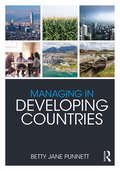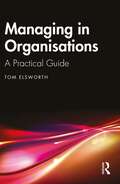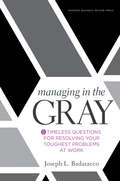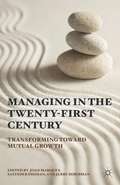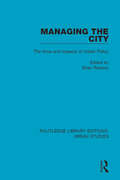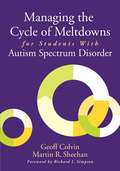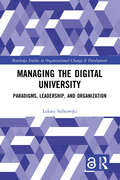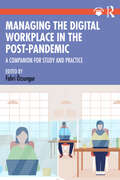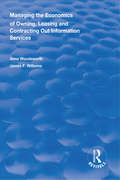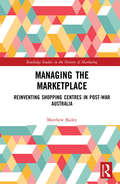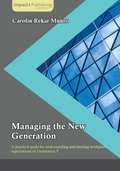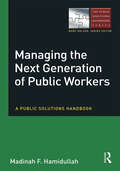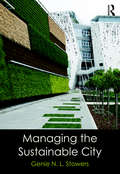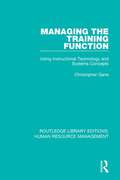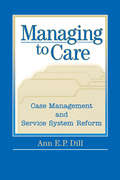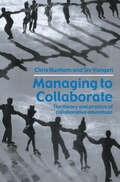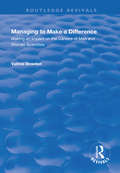- Table View
- List View
Managing and Organizations: An Introduction to Theory and Practice
by Stewart R Clegg Tyrone S. Pitsis Matthew MountCovering the fundamentals of organizational behaviour, as well critically reflecting on the institutions and practices of business life, the seventh edition of Managing and Organizations has been updated to include: • A new chapter on Managing Diversity and Inclusion written by Martyna Sliwa, Professor of Business Ethics and Organisation Studies at Durham University Business School. • A new chapter on Managing Motivation—what drives individuals and teams to excel. • New and revamped case studies and examples from well-known organizations such as Nike, Tiffany, Nokia, Walmart and OpenAI. • An increased focus on sustainability and ethics, demonstrating how organizations can thrive whilst protecting people and planet. This textbook is essential reading for anyone studying organizational behaviour at undergraduate or postgraduate level. Stewart Clegg is Professor at the University of Sydney, Australia and Emeritus Professor at the University of Technology Sydney, Australia. Tyrone S. Pitsis is Professor of Strategic Projects at the University of York, UK Matt Mount is Associate Professor of Strategy at the University of Adelaide, Australia.
Managing and Organizations: An Introduction to Theory and Practice
by Stewart R Clegg Tyrone S. Pitsis Matthew MountCovering the fundamentals of organizational behaviour, as well critically reflecting on the institutions and practices of business life, the seventh edition of Managing and Organizations has been updated to include: • A new chapter on Managing Diversity and Inclusion written by Martyna Sliwa, Professor of Business Ethics and Organisation Studies at Durham University Business School. • A new chapter on Managing Motivation—what drives individuals and teams to excel. • New and revamped case studies and examples from well-known organizations such as Nike, Tiffany, Nokia, Walmart and OpenAI. • An increased focus on sustainability and ethics, demonstrating how organizations can thrive whilst protecting people and planet. This textbook is essential reading for anyone studying organizational behaviour at undergraduate or postgraduate level. Stewart Clegg is Professor at the University of Sydney, Australia and Emeritus Professor at the University of Technology Sydney, Australia. Tyrone S. Pitsis is Professor of Strategic Projects at the University of York, UK Matt Mount is Associate Professor of Strategy at the University of Adelaide, Australia.
Managing at a Distance: A Manager’s Guide to the Challenges of the Hybrid and Remote World
by Tom Coughlan David J. Fogarty Gary Bernstein Lynda WilsonThe world of hybrid and remote management is a territory that has yet to be completely explored—this book provides some simple navigational aids to help managers and leaders find their way.Research indicates that over 56% of college graduates currently work either remotely or in a hybrid arrangement, while prior to the pandemic, less than 5% of working hours were remote. How to manage remote and hybrid workers has rapidly become a significant challenge, and one that often requires new policies and organizational restructuring. The remote work handbooks available are tactical, which can be helpful for day-to-day decisions but not to tackle larger issues and initiatives. This book presents a fully formed, research-backed strategic framework: more than a vehicle to the future, it will help leaders to understand where they are now and what is happening around them to change the landscape, and to decide where they want to be.Speaking to senior executives and team leaders, as well as business students, this book will become the preferred tool for the development and evaluation of remote and hybrid management policy and strategy across industries.
Managing at the Speed of Change
by Daryl R. ConnerThis classic, newly updated, is an indispensable source for anyone-from mid-level managers to CEOs-who must execute key business initiatives quickly and effectively. Once groundbreaking and now time-honored, Managing at the Speed of Change has helped countless business leaders learn how to orchestrate transitions vital to their organizations' success. Rather than focusing on what to change, this book's aim is far more valuable: It shows readers how to change.Daryl R. Conner, founder and chairman of the consulting firm Conner Partners, is a leading expert on change management. He has served as "change doctor" for clients that include non-profit enterprises, government agencies and administrations, and Fortune 500 companies in an array of industries such as Abbott Laboratories, PepsiCo, American Express, Catholic Healthcare West, JPMorgan Chase, and the U.S. Navy.Based on Conner's long-term research and his decades of consulting experience, Managing at the Speed of Change uses simple, easy-to-understand language and elegant visuals to explore the dynamics of change, and in doing so, teaches readers* why major change is difficult to assimilate* what distinguishes resilient individuals from those who suffer future shock* how and why resistance forms* how people become committed to change* why organizational culture is so important to the success of change* the roles most central to change in organizational settings* why powerful teamwork is at the heart of achieving change objectives, and how to foster itIn this pioneering book, updated for the twenty-first century, Conner demonstrates how both individuals and organizations can develop the capacity not only to endure change but to thrive on it.From the Hardcover edition.
Managing for Resilience: A Practical Guide for Employee Wellbeing and Organizational Performance
by Monique F. CraneIn an era of longer hours and shorter contracts, of tighter margins and frequent organizational change, stress can undermine both the mental health and performance of employees. A culture of resilience in the workplace, however, offers the potential to support psychological wellbeing and improve the performance of both people and organizations. This is the first book to provide managers with a guide to fostering psychological resilience within their teams. It synthesises not only the latest cutting-edge research in the area, but also translates this into practical advice for a range of organizational settings. Chapters cover the following important issues: Key personality factors related to resilience How job design and routines can improve employee resilience How to build a resilient team Communicating change and improving teamwork Modelling resilient thinking and behaviour as a leader Selecting the right resilience training for your organisation This is the ideal book for anyone interested in fostering a high-performance and emotionally resilient workforce, whether they are a manager, HR professional or occupational psychologist. Its cutting edge approach will also make it important reading for students and researchers of organizational and occupational psychology.
Managing in Complexity: How Our Fears of Uncertainty Can Hurt Us and What To Do About It
by Sara FilbeeChallenging traditional ways of thinking, leading, and managing based on cutting-edge research and real-world examples, this book provides an insightful and accessible perspective for leaders and managers in the 21st century who seek to become more effective in an increasingly uncertain and complex world which limits their ability to get results. Just how significant this is has become all too evident in the Covid-19 pandemic. Many books have been written to address these leadership and management challenges, but they are based on the premise that there are ways to simplify, organise, and control what is going on in the workplace. In our complex world this is not possible, and there are no magic tools and techniques that will ensure success. This book explains why and offers an alternative approach, incorporating social theory and the sciences of uncertainty, written in plain English by a leader with over 40 years of experience in the private, not-for-profit, and federal government sectors. Each chapter focuses on a single key concept and is introduced by a story illustrating how these key ideas can be applied in the workplace and includes practical suggestions for leaders and managers at all levels and across sectors to incorporate these perspectives into their day-to-day work practice, making it easy for readers to use the book as a reference guide. All who manage in complex times and uncertain environments will appreciate this accessible and actionable book that will inspire a radical rethink of current management orthodoxy and help them to become more effective.
Managing in Developing Countries
by Betty Jane PunnettThis book considers management theories and approaches specifically in the context of developing countries. In recent years, international business scholarship has increased its focus on the developing world, which represents 80 percent of the global population and has doubled its share of value-added trade in the past two decades. This text will help readers to manage successfully in this region by learning to assess, apply, and adapt established practices in developing countries. Punnett begins by identifying the characteristics of the developing world—Africa, Asia, the Caribbean, India, Latin America, and the Middle East—and the companies therein to help students understand how the reality of these countries influences business and management. By tracking a fictional product through the internationalization process, students will navigate the challenges of operating an international company from a developing country base, using a traditional model of management focused on planning, organizing, staffing, leading, and controlling. They will also gain insight into ethical considerations likely to arise, such as differential treatment based on personal characteristics and age dispersion. Cases, discussion questions, personal stories, and end-of-chapter exercises will help readers to grapple with issues and test their learning. Complete with chapter objectives and "Lessons Learned" boxes to facilitate understanding, Managing in Developing Countries is an excellent supplement for international business or international management students with a special interest in the developing world.
Managing in Organisations: A Practical Guide
by Tom ElsworthManaging in Organisations is a concise, accessible, and practical approach to the difficult job of line management. It offers a kit of management tools and a range of worked examples that can be used to address the key tasks that managers face in the workplace. This book provides clear insights into how people behave everyday in real organisations. The fundamentals of key theories and sources are covered throughout for those coming to the subject for the first time. Topics covered include individual, group, and team organisational behaviour; organisational culture and diversity; supervision and leadership; organisational design; management and change; and governance. This book considers small and larger enterprises as well as public, private, and third sectors. Short cases link the issues in the chapter and provide opportunities for developing skills and discussion. This book provides an introduction to the world of managing in organisations and is suitable for those who study organisational behaviour, organisational studies, management, and human resource management. It will also be very useful to the entrepreneur planning a small start‑up and to the busy manager of a small‑ or medium‑sized enterprise seeking to understand how best to manage the organisation for performance.
Managing in the Gray: Five Timeless Questions for Resolving Your Toughest Problems at Work
by Joseph L. Badaracco Jr.How to Resolve the Really Hard ProblemsEvery manager makes tough calls-it comes with the job. And the hardest decisions are the "gray areas"-situations where you and your team have worked hard to find an answer, you've done the best analysis you can, and you still don't know what to do. But you have to make a decision. You have to choose, commit, act, and live with the consequences and persuade others to follow your lead. Gray areas test your skills as a manager, your judgment, and even your humanity. How do you get these decisions right?In Managing in the Gray, Joseph Badaracco offers a powerful, practical, and even radical way to resolve these problems. Picking up where conventional tools of analysis leave off, this book provides tools for judgment in the form of five revealing questions. Asking yourself these five questions provides a simple yet profound way to broaden your thinking, sharpen your judgment, and develop a fresh perspective. What makes these questions so valuable is that they have truly stood the test of time-they've guided countless men and women, across many centuries and cultures, to resolve the hardest questions of work, responsibility, and life.You can use the five-question framework on your own or with others on your team to help you cut through complexities, understand critical trade-offs, and develop workable solutions for even the grayest issues.
Managing in the Twenty-first Century
by Satinder Dhiman Joan Marques Jerry BibermanThe purpose of this work is to enhance understanding and the overall learning experience in OB, and ultimately, to help shape a more conscious workforce of people who have what it takes to succeed during uncertain times despite the ebb and flow of the market.
Managing the City: The Aims and Impacts of Urban Policy (Routledge Library Editions: Urban Studies #20)
by Brian RobsonThis book, first published in 1987, addresses questions which have gained new importance in the light of the continuing erosion of the economic base and social stability of cities. The recurring riots in inner cities are but the outward manifestation of the profound collapse of the civic societies of our cities. This book addresses three main issues: What has gone wrong? What successes and failures have changes in policy had? And what should be the shape of future urban policy? This book will be interest to students of sociology, urban studies and human geography.
Managing the Cycle of Meltdowns for Students with Autism Spectrum Disorder
by Geoff Colvin Martin R. SheehanBased on Geoff Colvin's bestselling book, Managing the Cycle of Acting-Out Behavior in the Classroom, this practitioner-friendly guide provides special and general education teachers of autistic students with a six-phase positive behavior support model that includes interventions for each phase. Outlining practical steps for preventing and responding to the various phases of meltdown behavior in students with autism spectrum disorder, you'll find: An overview of ASD Examples of meltdown behavior Common triggers Addressing sensory issues Establishing expectations and rules Collaborating with parents And much moreTeachers will find experienced guidance for providing a supportive environment in which students with ASD can succeed.
Managing the Digital University: Paradigms, Leadership, and Organization (Routledge Open Business and Economics)
by Łukasz SułkowskiThe reflection on university management is based on the question about the shape of universities of the future. Civic, responsible, sustainable, virtual, digital, and many other universities can be mentioned among the concepts present in the literature. All these names describe an important distinctive feature of a university, which will gain more and more importance in the future. However, given the fundamental importance of the radical change taking place, it seems that the most appropriate name, reflecting the essence of the emerging new formation, is "digital university." This is because of the importance of digital transformation, which has been developing for several decades, bringing deep and multidirectional changes in the areas of technology, economy, society, and culture. It is a disruptive civilizational transition and, although stretched over many decades, it is revolutionary in nature, significantly changing our lives in the Anthropocene. The book has three cognitive and pragmatic objectives: to provide a new perspective on the changing academic organization and management; to reflect on higher education management concepts and methods; and to present an overview of university management, governance, and leadership, useful from the perspective of academic managers, and other stakeholders. The Open Access version of this book, available at www.taylorfrancis. com, has been made available under a Creative Commons Attribution-Non Commercial-No Derivatives 4.0 license.
Managing the Digital Workplace in the Post-Pandemic: A Companion for Study and Practice
by Fahri ÖzsungurManaging the Digital Workplace in the Post-Pandemic provides a cutting-edge survey of digital organizational behaviour in the post-pandemic workplace, drawing from an international range of expertise. It introduces and guides students and practitioners through the current best practices, laboratory methods, policies and protocols in use during these times of rapid change to workplace practices. This book is essential reading for students, researchers and practitioners in business and management. The book draws on global expertise from its contributors while being suitable for class and educational use, with each chapter including further reading, chapter summaries and exercises. Tutors are supported with a set of instructor materials that include PowerPoint slides, a test bank and an instructor's manual. This text covers a wide range of themes in this fast-developing field, including: The effect of the pandemic on the digital workplace Gender and cyberbullying in the context of the digital workplace Digital ergonomics and productivity Digital conflict management
Managing the Economics of Owning, Leasing and Contracting Out Information Services (Routledge Revivals)
by Anne Woodsworth James F. Williams IIFirst published in 1993, the purpose of this book is to identify and describe the most important factors that must be considered in making decisions about the optimal ways to provide access to information – in short, the best way to use the humans, the machines, and the intangible resources known as information, particularly at the organizational level. In recent years executives have begun to outsource computing and telecommunications functions, primarily to control costs. Traditional libraries and information centres have been disbanded in favour of service contracts or outright leasing of staff. Both the public and private sectors are examining their information service operations from the point of view of cost effectiveness. Decisions about owning versus leasing of information are being made daily. Decision-makers are finding that they must deal differently with funding and budgeting of information systems and libraries from their earlier practice. New paradigms for these service functions already exist. Not only have corporations and governments begun to contract out entire information service operations, but libraries themselves have begun to consider the costs, effectiveness, and implications of outsourcing some of their operations and services. This book provides a framework for decision-makers to view and review information services within their organizations. Entire units, components of libraries and information centres are defined and untangled so that the widest variety of organizations can analyse their own environments. Each chapter is accompanied by comments from a broad range of experts in the information field.
Managing the Marketplace: Reinventing Shopping Centres in Post-War Australia (Routledge Studies in the History of Marketing)
by Matthew BaileyThis book charts the history of Australian retail developments as well as examining the social and cultural dimensions of shopping in Australia. In the second half of the twentieth century, the shopping centre spread from America around the world. Australia was a very early adopter, and produced a unique shopping centre model. Situating Australian retail developments within a broader international and historical context, Managing the Marketplace demonstrates the ways that local conditions shape global retail forms. Knowledge transfer from Europe and America to Australia was a consistent feature of the Australian retail industry across the twentieth century. By critically examining the strengths and weaknesses of Australian retail firms’ strategies across time, and drawing on the voices of both business elites and ordinary people, the book not only unearths the forgotten stories of Australian retail, it offers new insights into the opportunities and challenges that confront the sector today, both nationally and internationally. This book will be of interest to all scholars and practitioners of retail, marketing, business history and economic geography, as well as social and cultural history.
Managing the New Generation
by Carolin Rekar MunroThis book is written to help managers and business leaders harness the talent and skills of Gen Y.
Managing the Next Generation of Public Workers: A Public Solutions Handbook (The Public Solutions Handbook Series)
by Madinah F HamidullahManaging the Next Generation of Public Workers is a fresh and energetic look at the changing climate of diversity in the public and nonprofit workplace. The workforce of the twenty-first century represents unparalleled complexity: Baby Boomers, GenX, GenY, and Millennials. Although that diversity may be challenging and often overwhelming for public managers, Madinah Hamidullah emphasizes the potential strengths that can be drawn from complex multigenerational relationships. This handbook offers public and nonprofit managers the tools necessary to address generational differences and questions such as: • How do the newer generations in the workplace differ on such fundamentals as work ethic, family values, and retirement horizons? • Are they recruited differently and do they expect a different mix of benefits—perhaps a better work-life balance as a tradeoff for a lower salary? • How can diverse, generational perspectives in the workplace add value by questioning old, traditional assumptions? • Will approaches to organizational decision making necessarily change as new generations take over? The book is for public and nonprofit managers who recognize the challenges of managing a multigenerational workforce, and are therefore seeking helpful insights. This volume is a roadmap not only for human resource (HR) managers, but for all managers who must address the complexities of the human condition—complexities that are complicated by the most rapid succession of workforce generations that we have yet seen.
Managing the Psychological Contract
by Abm AbdullahThis book explores the differences between Western and non-Western cultures to provide a more comprehensive understanding of psychological contract and its consequences on employees’ behavioral, attitudinal, and cognitive outcomes. Further, it discusses the culturally-relevant elements of HR practices that affect employee expectations, job satisfaction, commitment, and motivation based on their perceptions of the level of fulfilment of their psychological contract. Integrating both qualitative and quantitative methods, it is the first book to examine the current state of the South Asian workforce and will advance research on industrial relations, employee relationship management, and corporate management of South Asian employees around the world.
Managing the Sustainable City
by Genie N. StowersWe hear the term “sustainability” everywhere today. In the context of city management, the term often refers to environmental concerns, both locally and globally. Managing the Sustainable City examines not only how cities can prepare to weather the local effects of climate change, but also how urban centers can sustain themselves through other modern management challenges, including budgeting and finance, human resource management, public safety, and infrastructure. This clearly written and engaging new textbook provides a comprehensive overview of urban administration today, exploring the unique demographics of cities, local government political structures, intergovernmental relations, and the full range of service delivery areas for which cities are ever more responsible. Throughout the book, two important components of city management today—the use of technology and measuring performance for accountability—are highlighted, along with NASPAA accreditation standards and competencies. Particular attention is paid to incorporating Urban Administration standards to provide students using the text will have a thorough understanding of: The ethics of local government management The roles and relationships among local and elected/appointed government officials, as well as what makes local institutions different from other institutions Strategies for engaging citizens in local governance The complexities of intergovernmental and network relationships to develop skills in collaborative governance How to manage local government financial resources as well as human resources Public service values such as accountability, transparency, efficiency, effectiveness, ethical behavior, and equity and emphasized throughout the text, and discussion questions, exercises, and "career pathways" highlighting successful public servants in a variety of city management roles are included in each chapter. Managing the Sustainable City is an ideal textbook for students of public administration, public policy, and public affairs interested in learning how cities can be sustainable—in their management, their policies, and their interactions with their citizens—as well as in preparing for and managing the impacts of climate change.
Managing the Training Function: Using Instructional Technology and Systems Concepts (Routledge Library Editions: Human Resource Management #16)
by Christopher GaneThe effective development of human resources within the organisation is one of the most powerful contributions to the long-term growth and survival of the enterprise. This systematic and practical approach to training principles and practice, first published in 1972, provides a unifying framework as a guide to problem solving and action by executives. This step-by-step account, illustrated by case histories, shows how to apply the principles to analysing and solving varied training problems within organisations. This title will be of interest to managers, executives, and students of business studies and human resource management.
Managing the Work Situation: A Phenomenological Approach to Organization and Management in a Complex World of Work
by Lars KlemsdalManaging the Work Situation outlines a perspective on how organization and management in the contemporary world of work happens as active everyday accomplishments by workers and managers, facing and handling complex work situations with an excess of expectations.Based on philosophical and sociological phenomenology, notably Jean-Paul Sartre’s and Erving Goffman’s works, the book coins a situation-centric perspective on organization and management, and the concept of ‘situational sensemaking’, as the driving mechanism of organization as well as the focus of management – characterized as ‘situation management’.The book addresses an academic audience with interests in organization and management of work, both theoretically and practically. A prime audience will be (academic and executive) master students in organization and management.
Managing to Care: Case Management And Service System Reform
by Ann DillThe point of departure for Managing to Care is widespread concern that the present delivery of health and social welfare services is fragmented, uncoordinated, inefficient, costly, wasteful, and ultimately detrimental to clients' health and wellbeing. Dill traces the evolution of case management from its start as a tool for integrating services on the level of the individual client to its current role as a force behind the most significant trends in health care. Those trends include the entrenchment of bureaucracy, the challenges of once dominant professions, and the rise of corporate control. The author's purpose in adopting this analysis is to invite further scrutiny of the case management profession, and at the same time to identify new possibilities for its application.This volume brings together thoughts developed over many years of observing and participating in case management programs. It provides a multilayered perspective of case management, showing linkages among its social and historical contexts and the ways it is practiced today in diverse service settings. The author emerged convinced about the essential need for care coordination, and that present ways of providing care can work against our highest objectives in doing so. The paradoxes and contraindications embedded in case management practice became a major theme of the book.Managing to Care is highly critical of the ways case management has come to absorb and reflect the organizational flaws of the very service systems it was intended to reform. Too often management of the case comes to dominate care. The author does not call for a rejection of professional systems in favor of a resurrected informal community. While much can and should be done to strengthen our ties to one another, there will always be people whose problems require more expert help. Dill argues here that case management can provide such help, and provide it well, but only if it is grounded in the human dimension of a caring relatio
Managing to Collaborate: The Theory and Practice of Collaborative Advantage
by Chris Huxham Siv VangenCollaboration between organizations on different continents can raise issues of economic development, health, the environment, risk sharing, supply chain efficiency and human resource management. It is an activity that can touch upon almost every aspect of business and social life. In this notable text, the authors combine rigorous theory with practical examples to create a useful, practical, one-stop resource covering topics such as: the principles of the theory of collaborative advantage managing aims membership structures and dynamics issues of identity using the theory. The key features of the book include rich theory, drawn directly from practice, explained in simple language, and a coherently developed understanding of the challenges of collaboration, based on careful research. This significant text will be an invaluable reference for all students, academics and managers studying or working in collaboration.
Managing to Make a Difference: Making an Impact on the Careers of Men and Women Scientists (Routledge Revivals Ser.)
by Valmai BowdenThis title was first published in 2000: This work concerns the personnel and career management of scientists employed in four research settings: universities, government laboratories, research institutes and industrial laboratories. Its purpose is to describe and explain processes and practices, giving equal prominence to men and women in science. It explores the contexts in which the people (the scientific human resource) who are responsible for creating scientific knowledge carry out their work and build their careers. It draws on an empirical study of career management among research scientists in the four types of research setting and additional interest stems from issues concerning employment of "professional" staff at a time when organizations are undergoing enormous change.
